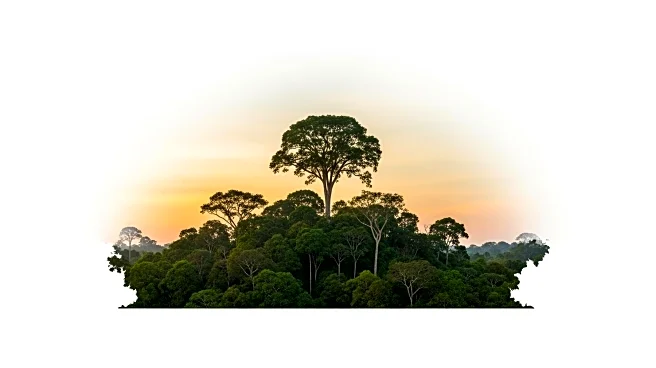What's Happening?
Suriname has announced a commitment to permanently protect 90% of its tropical forests, a move that significantly exceeds the global conservation target known as the '30x30' goal, which aims to protect 30% of land and oceans by 2030. This pledge was made during Climate Week in New York City by Foreign Minister Melvin W.J. Bouva on behalf of President Jennifer Geerlings-Simons. Suriname, which already has the highest share of forest cover globally, is recognized as a carbon sink, absorbing more carbon dioxide than it emits. The government plans to update conservation laws by the end of the year to enhance forest protections and recognize Indigenous and Maroon peoples' ancestral lands. A coalition of environmental donors has committed $20 million to support this initiative.
Why It's Important?
Suriname's pledge is a landmark decision in the fight against climate change, setting a new standard for conservation efforts in the Amazon region, which has been plagued by deforestation. By protecting its forests, Suriname contributes to global climate stability and biodiversity preservation, benefiting local communities and the world at large. The initiative could also boost ecotourism and the carbon credit market, providing economic opportunities while safeguarding the environment. However, the success of this pledge hinges on addressing Indigenous and tribal land rights, which remain unrecognized legally, and combating illegal activities such as mining and logging.
What's Next?
Suriname plans to update its conservation laws to strengthen forest protections and potentially recognize Indigenous and Maroon peoples' land rights. This legal framework is crucial for the effective implementation of the pledge. International support will be necessary to create sustainable alternatives to resource extraction, ensuring the protection of the forests. Indigenous communities are advocating for legal recognition as guardians of the forest, emphasizing their role in conservation efforts. The upcoming COP30 summit in Brazil will likely see further discussions on these issues, as Suriname's pledge sets a precedent for other Amazonian nations.
Beyond the Headlines
The pledge highlights the ethical and legal challenges surrounding Indigenous and tribal land rights in Suriname. Without legal recognition, these communities cannot fully participate in forest conservation efforts, despite being the most affected by deforestation and best positioned to protect the forests. The initiative also underscores the need for international collaboration to address illegal activities threatening the forests. Suriname's commitment could inspire other nations to adopt similar conservation goals, potentially leading to a broader shift in global environmental policies.









